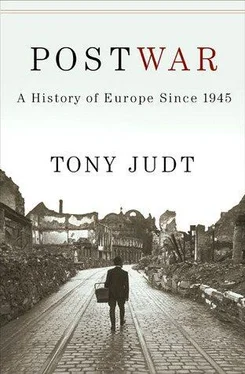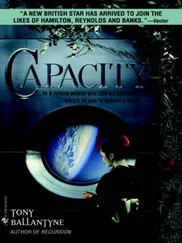The demobilization of the resistance was greatly facilitated by Soviet strategy, which favoured the restoration of parliamentary regimes in western Europe (as, nominally, in eastern Europe too). Communist leaders like Maurice Thorez in France and Palmiro Togliatti in Italy played a major role in ensuring the peaceful cooperation of their (sometimes bemused) followers. But many were willing to believe that the energies and ambitions of the resistance would now be channeled into political projects for national renewal.
Contacts made in the Resistance did sometimes survive—the post-war ‘depillarization’ of Dutch society, for example, the breaking down of the centuries-long denominational divide between communities of Catholics and Protestants, began with personal links forged in wartime. But plans for a post-war ‘Resistance Party’ failed everywhere. They came closest to fruition in Italy, where Ferrucio Parri became Prime Minister in June 1945 and promised that his Action Party would pursue the spirit and goals of the Resistance. But Parri was no politician and when he fell, six months later, political power shifted definitively into the hands of the traditional parties. De Gaulle, in France, was a far better political strategist but he, too, abandoned office (one month after Parri) rather than accommodate his wartime ambitions to parliamentary routine—thus paying unintended tribute to his own success in re-establishing the continuity of the Republic.
Rather than being governed by a new, fraternal community of resisters, then, most Europeans in the immediate post-war years instead found themselves ruled by coalitions of left and left-centre politicians rather similar to the Popular Fronts of the 1930s. This made sense. The only pre-war political parties able to operate normally in these years were those with anti-Fascist credentials—or, in Soviet-occupied eastern Europe, those to whom it suited the new authorities to ascribe such credentials at least for the time being. In practice this meant Communists, Socialists and a handful of liberal or radical groups. These, together with the newly-prominent Christian Democratic parties, thus constituted the parties of government in the first post-war years and they brought with them many of the policies and men of the Popular Front era.
The existing parties of the Left had gained immensely by their engagement in the wartime resistance: especially in France, where the Communists’ succeeded in converting their (sometimes exaggerated) wartime exploits into political capital and convinced even dispassionate observers of their unique moral standing—‘the great heroes of the Resistance’ as Janet Flanner described them in December 1944. It is thus not especially odd that the reform programs of post-war European governments echoed and recapitulated the unfinished business of the 1930s.
If experienced party politicians had so little difficulty displacing wartime activists after 1945 this was because, although they shared a common anti-Fascist ethos and a widespread desire for change, the Resistance and its heirs were rather vague on specifics. The Action Party in Italy sought to abolish the monarchy, nationalize large capital and industry and reform agriculture. The Action Programme of the French National Resistance Council had no king to depose, but its ambitions were otherwise similarly imprecise. Resistance units had been too preoccupied fighting, or just surviving, to busy themselves with detailed plans for post-war legislation.
But above all the resisters were handicapped by a lack of experience. Among clandestine organizations only the Communists had practical knowledge of politics, and except in the French case not much of that. But Communists in particular were reluctant to tie their hands with detailed programmatic statements that might alienate future tactical allies. The Resistance thus bequeathed little in the way of post-war projects beyond high-minded statements of intent and broad generalities—and even these, as the otherwise sympathetic François Mauriac noted in August 1944, were ‘hastily typed fantasy programs’.
On one thing, however, all were agreed—resisters and politicians alike: ‘planning’. The disasters of the inter-war decades—the missed opportunities after 1918, the great depression that followed the stock-market crash of 1929, the waste of unemployment, the inequalities, injustices and inefficiencies of laissez-faire capitalism that had led so many into authoritarian temptation, the brazen indifference of an arrogant ruling elite and the incompetence of an inadequate political class—all seemed to be connected by the utter failure to organize society better. If democracy was to work, if it was to recover its appeal, it would have to be planned .
It is sometimes suggested that this faith in planning, the political religion of post-war Europe, derived from the example of the Soviet Union: a planned economy that had ostensibly escaped the traumas of capitalist Europe, withstood the Nazi assault and won the Second World War thanks to a series of detailed Five Year Plans. This is entirely mistaken. In post-war western and central Europe only Communists put their faith in Soviet-style Plans (about which they knew very little), and even they had no notion of how such Plans might be applied to their local circumstances. The Soviet obsession with numerical targets, production quotas and centralized direction was alien to all but a few of the contemporary western advocates of planning. The latter—and they came in many varieties—were drawing on a very different set of sources.
The vogue for plans and planning began long before 1945. Throughout the interwar depression, from Hungary to Great Britain, voices were raised in support of a planned economy of one kind or another. Some of the ideas propounded, notably in Austria and among the British Fabians, derived from an older Socialist tradition, but many more had their origins in pre-1914 liberal reformism. The nineteenth-century ‘caretaker’ state, its attention confined to security and policing, was outmoded, so the argument ran. If only on prudential grounds—to forestall political upheavel—it would now be necessary to intervene in economic affairs to regulate imbalances, eliminate inefficiencies and compensate for the inequities and injustice of the market.
Before 1914 the main emphasis in such reformist projects was confined to calls for progressive taxation, protection of labour and, occasionally, state ownership of a restricted number of natural monopolies. But with the collapse of the international economy and the ensuing war, planning took on a greater urgency and ambition. Competing proposals for a national Plan, in which the state would intervene actively to support, discourage, facilitate and if necessary direct key economic sectors, circulated widely among young engineers, economists and civil servants in France and Germany.
For most of the inter-war years, would-be planners and their supporters languished in frustration at the political margins. The older generation of politicians was deaf to their appeals: to many on the conservative Right and Center state intervention in the economy was still abhorrent, while on the socialist Left it was generally believed that only a post-revolutionary society could plan its economic affairs rationally. Until then, capitalism was condemned to suffer and eventually collapse of its own contradictions. The idea that one might ‘plan’ a capitalist economy seemed to both sides a non-sense. The frustrated advocates of economic planning thus frequently found themselves attracted to authoritarian parties of the radical Right, distinctly more hospitable to their approach.
It was not by chance, therefore, that Oswald Mosley and some other British Labourites turned to Fascism out of frustration at their Party’s inadequate response to the Great Depression. In Belgium Hendrik de Man likewise failed to convince his fellow Socialists of the viability of his ‘Plan’ and began propounding more authoritarian solutions. In France a number of the brightest young leaders of the Socialist Party broke away to form new movements, frustrated at their party’s failure to respond imaginatively to the economic crisis. Many of these and others like them ended up as Fascists.
Читать дальше












